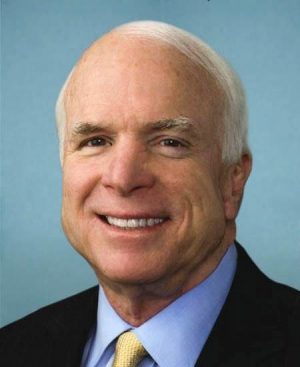We all can learn from John McCain’s legacy
This weekend, the nation lost Sen. John McCain to glioblastoma, or cancer in the glial cells of the brain. His career was marked by many mistakes, but his legacy of unparalleled moral character and his devotion to our country offer a shining example of dutiful citizenship.
Though he was often considered a staunch Republican and was criticized for his hawkish tendencies, McCain’s death dealt a serious blow to cooperative partisan relations in American politics. McCain’s humanity often shined through his work, earning him the respect of both allies and opponents in Congress. Unlike many politicians who choose to slander or dehumanize their political rivals, McCain chose to respect the dignity of his coworkers across the aisle.
McCain’s political grace was perhaps best demonstrated during a town hall meeting in the heat of the 2008 presidential election. During the meeting, a woman claimed she couldn’t trust then-Sen. Barack Obama because “he’s an Arab.” McCain could have capitalized on the woman’s fears. He could have amplified her misinformation to build support for his campaign. Instead, McCain rebuffed the woman, saying, “No ma’am, he is a decent family man and citizen that I just happen to have disagreements with on fundamental issues.” In moments like these, McCain demonstrated a level of political respect that is often absent from modern American politics.
By refusing to fan the flames of hateful crusaders, McCain lost the support of many voters. He prioritized honesty in his campaign and did his best to focus on political issues instead of attacking Obama’s character. Lesser men would have exploited those voters’ anger and frustration; just eight years later, a lesser man did.
Though they were members of the same party, McCain and President Donald Trump were natural enemies in politics. McCain’s commitment to ethical politics starkly contrasted Donald Trump’s bombastic, brash and brutal rhetoric. Trump’s marital faithlessness and crude personal history placed him and McCain in diametric opposition.
For a time, McCain towed the party line and supported Trump after he won the party’s nomination. But when tapes of Trump’s “locker room talk” surfaced, McCain publicly revoked his support for Trump, stating, “[Trump’s] demeaning comments about women and his boasts about sexual assaults make it impossible to continue to offer even conditional support for his candidacy.”
McCain continued to serve as a reasonable voice after Trump’s inauguration, speaking out against President Trump and his administration’s policies. McCain voted against the repeal of the Affordable Care Act, breaking away from his party and ostensibly thwarting the Republican-led Congress.
Even now, McCain’s respect for character and moral leadership is demonstrated by his decision to invite President Obama, the man that prevented McCain from becoming the leader of the free world, and President George Bush to speak at his funeral.
Personally, McCain and I often differed on policy, whether it be abortion rights, climate change, or his support for the McCain-Feingold Act. Despite these differences, I will always admire John McCain. He was a Marine, a war hero, and a principled opponent of partisanship. He will be dearly missed as a moral compass in the world of politics. We may not be able to count on our leaders to pick up the torch McCain carried, but we can each carry on his legacy by shedding our political identities long enough to respect our friends, even when we are in deep disagreement.
Your donation will support the student journalists of Tulane University. Your contribution will allow us to purchase equipment and cover our annual website hosting costs.
















Leave a Comment